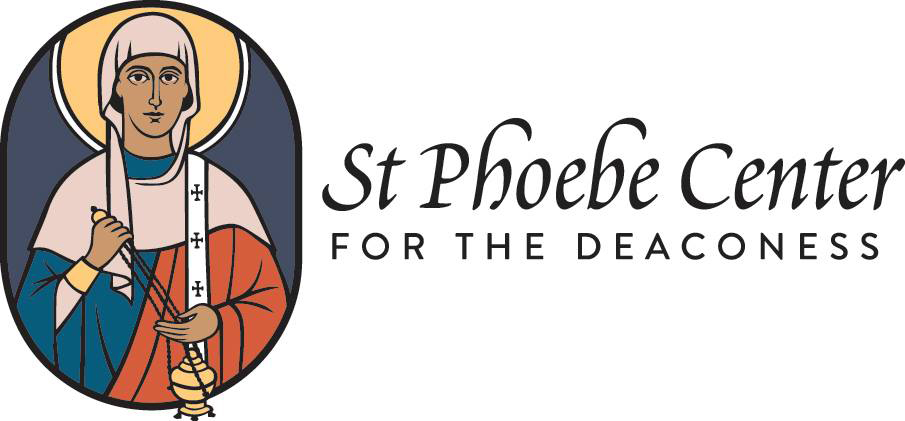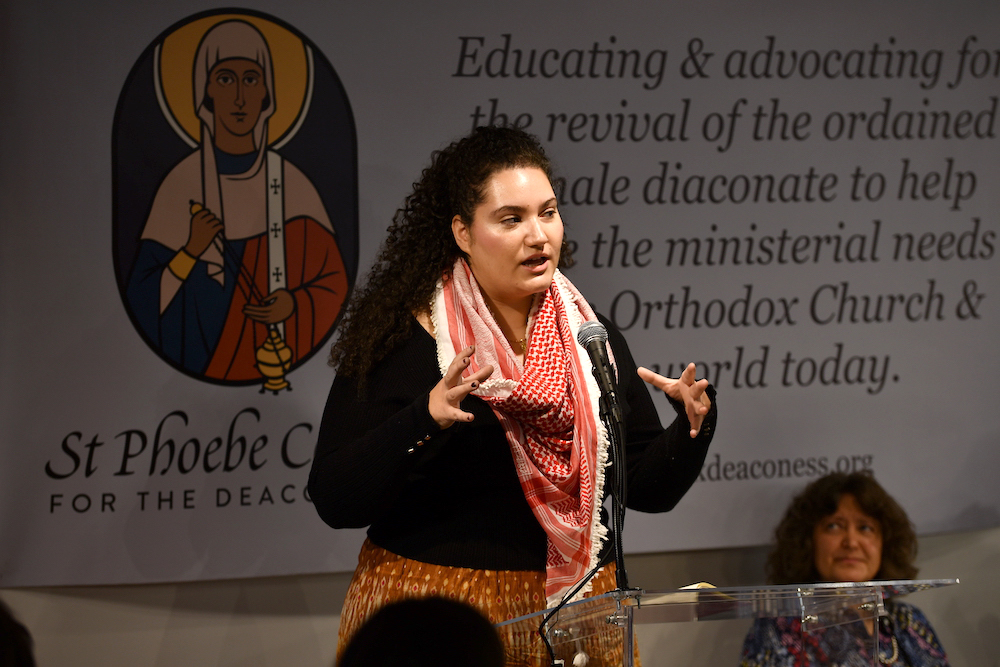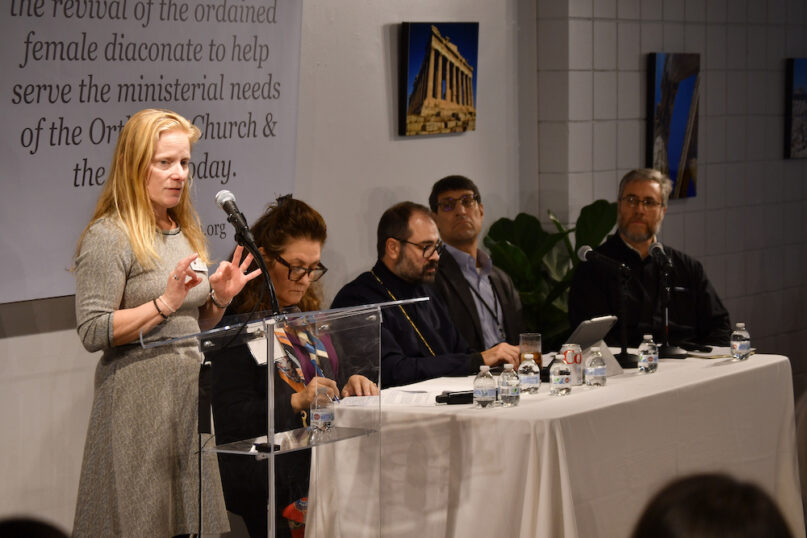BROOKLINE, Mass. (RNS) — A consortium of Orthodox Christian scholars, clergy and lay supporters meeting this week outside Boston proposed guidelines for the church to revive the ancient practice of allowing women to be deacons.
The proposed guidelines are not intended simply to ignite conversation about the need for female deacons, their authors say, but to launch a pilot program for their reinstitution.
“Despite the many calls for deaconesses today, there has not yet been an effort to create a concrete process with pragmatic steps towards ordaining deaconesses,” said Carrie Frederick Frost, an Orthodox theologian, professor and author and chair of the St. Phoebe Center, which sponsored the Nov. 10-12 symposium on women deacons at Hellenic College Holy Cross Greek Orthodox School of Theology and St. Mary Orthodox Church.
The Orthodox Church never formally banned or discontinued female deacons, but they became scarce in the Middle Ages amid an increasing emphasis on male monastic practice and a declining need for baptizing female adult converts.
Frost shared women’s stories of grappling with sexual abuse, miscarriages, stillbirths and other traumas particular to women, which she suggested women ordained to provide pastoral care could serve.
“Some of these gifts are already being shared with the Orthodox Church here in the 21st century,” Frost said. “This is wonderful, but it does not reflect the ways in which women’s gifts would be truly infused into the church if women were ordained as deaconesses and thus had the sacramental blessing of this ministry, connecting their gifts and their diaconal service to the sacramental life of the church.”
The Ecumenical Patriarch Bartholomew of the Eastern Orthodox Church, based in Istanbul, sent “best wishes” to the more than 130 people who attended.
“May your discussions bear fruitful outcomes, and we eagerly anticipate the insights and recommendations that shall emanate from your deliberations,” he said in a letter. The patriarch earlier endorsed the call for renewing the female diaconate in a 2020 document on social ethics.
Archbishop Elpidophoros of the Greek Orthodox Archdiocese of America also blessed the conference.
Hopes that women could be made deacons have been raised of late in the Roman Catholic Church, as a recent global synod considered ways to expand the role of women, including a female diaconate. But in an interview in June, Pope Francis dismissed the possibility and the synod’s report was noncommittal about the issue.
The symposium marked the 10th anniversary of St. Phoebe Center, named for an early Christian deaconess mentioned in the New Testament’s Letter to the Romans. Its members work to increase the role of women in the Orthodox Church, short of ordaining them to the priesthood.

St. Phoebe Center for the Deaconess logo. (Courtesy image)
The center’s plan proposes that a synod of bishops create a commission of clergy and laity to refer five to eight women with theological training to their bishops for evaluation and ordination. Then, after a three-year period of evaluation, the commission could improve upon the process for future generations of deaconesses.
Metropolitan Nathanael of Chicago addressed the symposium, expressing his doubts about a quick timeline to ordain deaconesses. “Who is going to champion this?” he asked, noting the absence of men at the event. Calling the guidelines “delusional” in parts and “radical” in others, he said, “I like radical but not delusional.”
At an international Orthodox conference in Rhodes, Greece, in 1988, then-Ecumenical Patriarch Demetrios I pointed out that the female diaconate was never officially rejected and concluded that “the apostolic order of deaconesses should be revived.” Gatherings of Orthodox women have been agitating for its revival since 1976.
“I’m a little discouraged, I confess, by hearing with regularity, even amongst us who are all supporting this, that the deaconess can’t happen now, that we’re not ready, that we don’t want to scandalize people,” said Elizabeth Prodromou, an adviser to the St. Phoebe Center and human rights, religion and diplomacy expert who works with the Ecumenical Patriarchate against modern slavery. “And I guess the question I would ask all of us is, is the scandal, which is our current condition of error, somehow less offensive, less damaging, less traumatizing, less, you know, scandalous?”
Prodromou said the church needs to collect data on the number of laity and clergy who know the history of the female diaconate and whether they would support its revival.
St. Phoebe’s guidelines draw from a 2014 document by St. Catherine’s Vision that sought to “rejuvenate” the function of both male and female deacons to be more comprehensive and aligned to ancient functions of deacons, such as delivering food and Holy Communion to the poor and sick.
The Orthodox Church has not formally defined the role of deacons and not every parish has them. Where deacons exist, they usually assist priests with liturgical duties such as preparing the Eucharist and with administrative tasks and are almost exclusively male, with exceptions in some Oriental Orthodox churches. Nuns also sometimes serve in the liturgical roles of deacons at women’s monasteries.
Several women who attended the conference shared some of their experiences at church that made them feel less valued than men or boys.

Sophia Kyrou speaks during a symposium on women deacons, at Hellenic College Holy Cross Greek Orthodox School of Theology and St. Mary Orthodox Church in Brookline, Mass. (Photo by Sarah Riccardi-Swartz and JD Swartz/St. Phoebe Center)
Sophia Kyrou, who studied Byzantine chant, recalled the moment her metropolitan tonsured her as a reader and chanter, liturgical roles in which laypeople assist the priest during worship services. Tonsuring is a ritual that sets apart the person from the laity, but is not ordination. Her parish priest had wanted to tonsure only the parish’s altar boys, even though Kyrou was better trained and older.
“Young men I had considered my friends were behind my back laughing and deriding the fact that I, as a young woman, had been tonsured,” Kyrou said. “They had been saying the women should stick to the pews.”
Last month Ancient Faith Ministries, a pan-Orthodox media ministry and department of the Antiochian Orthodox Church, canceled a planned radio segment with Frost two days before a scheduled recording session after Frost refused the show’s request not to talk about deaconesses or her latest book, “Church of Our Granddaughters.”
“We operate within the blessing of the Antiochian archdiocese. Ancient Faith therefore does not teach or lobby for the ordination of women,” CEO Melinda Johnson said in an Oct. 19 statement announcing the cancellation.
In the African Orthodox Church, which is under the Greek Orthodox Patriarchate of Alexandria and all Africa, a woman is expected to be ordained a deacon before the end of the year by the Metropolitan of Zimbabwe and Angola Serafim Kykotis. In 2017, Patriarch Theodoros II of the Alexandrian Patriarchate consecrated nuns as subdeaconesses in Congo but did not ordain them, reportedly because donors outside Africa threatened to pull their funding.
At the conference, the St. Phoebe Center launched a grant for African Orthodox women to apply for funding to travel to conferences and pay seminary tuition.
“Women need women’s gifts,” Frost said.





